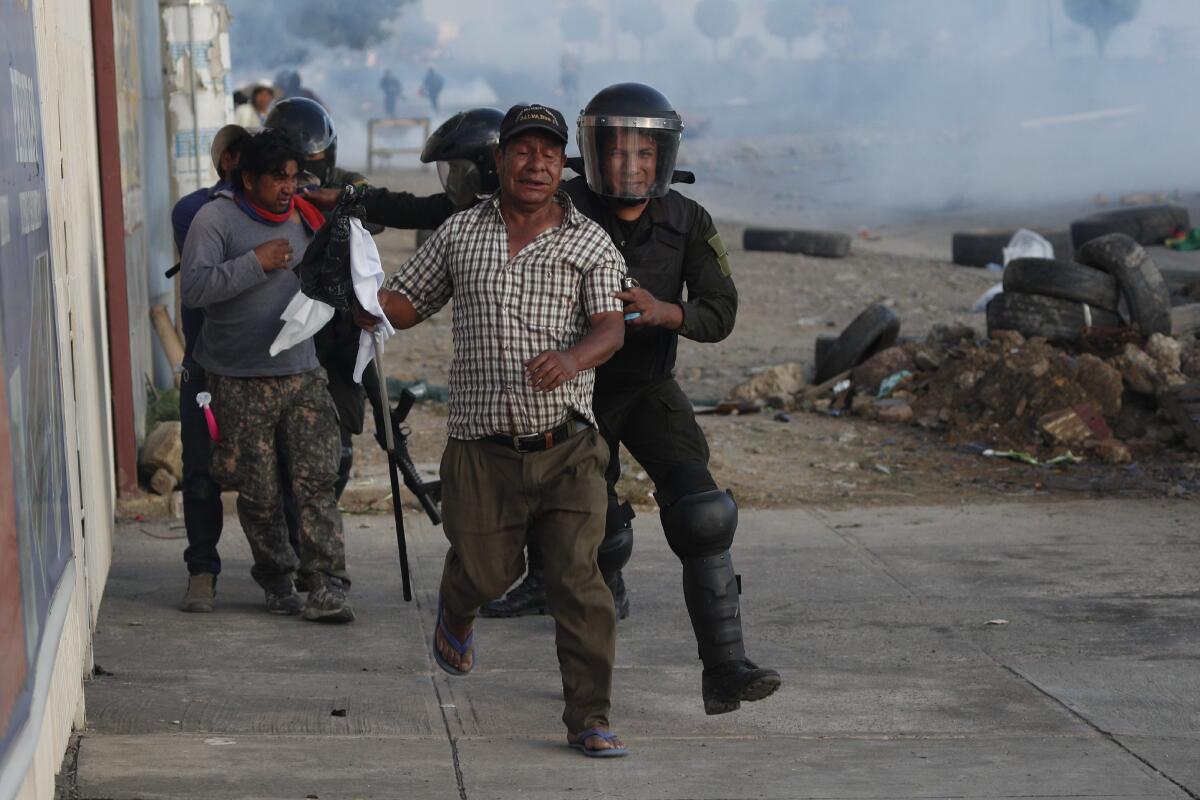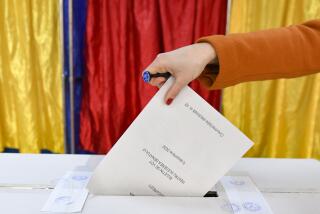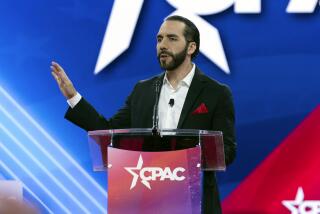Does Trump support democracy in Latin America? Critics say it depends who’s in power

A president in Latin America skirts term limits to run for office again.
He wins, but allegations that the election was rigged ignite mass street protests.
A team from the hemisphere’s main diplomatic body — the Organization of American States — finds widespread fraud and recommends new elections.
That chain of events unfolded in recent years in both Honduras and Bolivia.
But when it came to the U.S. response in each place, the Trump administration appeared less concerned about fraud than another question: Was the leader in question friend or foe?
U.S. Secretary of State Michael R. Pompeo recently described its Latin America policy as “realism, restraint and respect.”
“I’m proud of what we’ve done in the region,” he said in a speech last month. “There is more democratic cooperation in our hemisphere today than at any point in history, and we’re proud of the fact that we have been a part of helping them get to that place.”
But current and former U.S. officials say the administration’s stated goals of supporting democracy and fighting corruption in Latin America have been subsumed by the outsize influence of ideologues inside the White House.
Geopolitical concerns, of course, have often beat out principle when it comes to U.S. policy in Latin America, most notably when the region was a Cold War battleground.
Now, as then, experts say, the pursuit of short-term political gains such as certain election results has the potential to waste U.S. money, prop up corrupt or oppressive governments and undermine U.S. authority in the region.
U.S. government actions “are no longer grounded in coherent policy,” said Benjamin Gedan, a former National Security Council official who is deputy director of the Latin America program at the nonpartisan Wilson Center think tank in Washington. “The real credibility problem here is for U.S. foreign policy.”
That could make it difficult for the administration to deal with the unrest now sweeping many parts of Latin America — from Chileans protesting economic inequality to Colombians demanding an end to corruption and violence.
The contrast between its handling of election fallout in Honduras and the nearly identical scenario in Bolivia offers a stark lesson in how the Trump administration approaches the region.
Even as votes were still being counted in Honduras in December 2017, the U.S. congratulated Juan Orlando Hernandez on victory.
The endorsement, which came despite OAS recommendations for new balloting because of rampant election fraud, shocked numerous Latin American leaders as well as Democratic lawmakers in the United States.
In a briefing at the time, a senior State Department official falsely contended that the OAS was changing its assessment about malfeasance and that the U.S. recognition of Hernandez was appropriate.
The U.S. stance was widely seen as a reward for Hernandez, a right-wing politician who has played by the White House rules and heaped praise on President Trump. He had complied with U.S. demands to help cut off the flow of immigrants into the United States.
And days after the election, Honduras became one of only a handful of countries that voted with the U.S. in the United Nations in support of Trump’s decision to recognize Jerusalem as the capital of Israel and move the U.S. Embassy there from Tel Aviv.
Trump has continued support for Hernandez, who visited senior administration officials in Washington last month despite having been named by federal officials as a co-conspirator in his brother’s drug-trafficking trial.
A Manhattan court in October found Tony Hernandez guilty of running a “state-sanctioned” multimillion-dollar operation funneling drugs into the United States. Juan Orlando Hernandez has denied involvement.
The U.S. approach to Bolivia after its presidential election Oct. 20 could not have been more different.
There, the Trump administration opposed Evo Morales, the left-wing indigenous leader who has frequently denounced what he considers U.S. “imperialism” in the region.
The U.S. embraced OAS findings denouncing election fraud and celebrated when Morales fled the country on Nov. 12 after losing support of the military — a departure his supporters call a military coup.
Trump administration officials quickly congratulated Bolivia on its ouster of Morales and heaped praise on Jeanine Anez, a conservative senator who waved a Bible and declared herself interim president while future elections are arranged.
There is still no date for another election, while the interim government has moved to reestablish diplomatic relations with Washington, expel dozens of Cubans and cut ties with the socialist government in Venezuela.
“We support @JeanineAnez in Bolivia as she works to ensure a peaceful democratic transition through free elections,” Trump tweeted on Dec. 17. “We denounce the ongoing violence and those that provoke it both in Bolivia and from afar. The U.S. stands with the people of the region for peace and democracy!”
Gedan, of the Wilson Center, said that while the Bolivian election appeared to be seriously flawed, the administration rushed to judgment without adequate examination of the evidence. “They treated the findings [prematurely] as gospel,” he said.
Carlos Trujillo, the U.S. ambassador to the OAS, had steered the group’s election-monitoring team to report widespread fraud and pushed the Trump administration to support the ouster of Morales. (The State Department denied Trujillo exercised undue influence on the report and said it respects the autonomy of the OAS. Trujillo, through a spokesman, declined a request for an interview.)
Trujillo, a 36-year-old former state representative in Florida, was appointed to his post months after the Honduras election controversy. He is a staunch ally of Sen. Marco Rubio (R-Fla.), a hawk on Latin American issues who has gained broad influence over U.S. policy in the region.
At his swearing-in ceremony, Trujillo delivered an unusually partisan speech that condemned President Obama and his policies in Latin America, especially the expansion of relations with Cuba. He has also led the successful campaign to expel Venezuela from the OAS.
Venezuela, which plays a far bigger role than Honduras or Bolivia in the region’s geopolitics, has presented an entirely different set of challenges to the United States.
The Trump administration would like to remove Nicolas Maduro, the country’s socialist president, saying it seeks to restore democracy.
But Maduro has been able to hang on to power despite helping drive the country into economic crisis and a concerted U.S. effort to prop up an opposition-led government.
It is the loyalty of the military that has allowed him to hang on. Venezuelan security services were systematically groomed in ideology under Maduro and, more important, the late Hugo Chavez, a former army commander who ruled the country from 1999 until his death in 2013.
Francisco Santos, the Colombian ambassador to Washington who has been active in the Venezuela crisis, contrasted the situation with Bolivia, where the chief of the armed forces turned against Morales.
“There has been some fracturing in Venezuela, but the top guys are still there,” he said.
Wilkinson reported from Washington and McDonnell from Mexico City.
More to Read
Start your day right
Sign up for Essential California for news, features and recommendations from the L.A. Times and beyond in your inbox six days a week.
You may occasionally receive promotional content from the Los Angeles Times.







